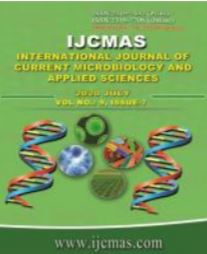


 National Academy of Agricultural Sciences (NAAS)
National Academy of Agricultural Sciences (NAAS)

|
PRINT ISSN : 2319-7692
Online ISSN : 2319-7706 Issues : 12 per year Publisher : Excellent Publishers Email : editorijcmas@gmail.com / submit@ijcmas.com Editor-in-chief: Dr.M.Prakash Index Copernicus ICV 2018: 95.39 NAAS RATING 2020: 5.38 |
Trichoderma is a free living fungi which are highly interactive in root, soil and foliar environments as well. Trichoderma can be used as a biological control agent due to its ability such asmycoparasitism, production of antibiotic and/or hydrolytic enzymes, competition for nutrients, as well as induced plant resistance; production of numerous secondary metabolites inhibitory to the growth of several plant pathogens. In this study, the antagonistic potential of some native rice specific Trichoderma isolates were evaluated against sheath blight disease of rice caused by Rhizoctonia solani. It revealed that the inhibition percentages of R. solani by the native rice specific Trichoderma isolated from various soil samples of Manipur ranges from 62.50% to 87.50% with highest per cent inhibition by WAI-D,T. harzianum (MH257323), and lowest by LAM-B,T. brevicompactum (MH257322) of 87.50% and 62.50% respectively. Bell’s scale study showed class III category by T. brevicompactum (MH257322) and class II showed by T. harzianum (MH257323) against Rhizoctonia solani. Among the native rice specific Trichoderma isolates, WAI-D, T. harzianum (MH257323) is found to be the most effective in reducing the rapid growth of pathogen. Further, all native Trichoderma isolates significantly inhibited the mycelial growth of the pathogen.
 |
 |
 |
 |
 |